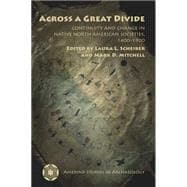
| Foreword | p. vii |
| Crossing Divides: Archaeology as Long-Term History | p. 1 |
| Agency and Practice in Apalachee Province | p. 23 |
| Long-Term History, Positionality, Contingency, Hybridity: Does Rethinking Indigenous History Reframe the Jamestown Colony? | p. 42 |
| When Moral Economies and Capitalism Meet: Creek Factionalism and the Colonial Southeastern Frontier | p. 61 |
| Not Just "One Site Against the World": Seneca Iroquois Intercommunity Connections and Autonomy, 1550-1779 | p. 79 |
| A Prophet Has Arisen: The Archaeology of Nativism among the Nineteenth-Century Algonquin Peoples of Illinois | p. 107 |
| Mountain Shoshone Technological Transitions across the Great Divide | p. 128 |
| The Plains Hide Trade: French Impact on Wichita Technology and Society | p. 149 |
| "Like Butterflies on a Mounting Board": Pueblo Mobility and Demography before 1825 | p. 174 |
| The Diné at the Edge of History: Navajo Ethnogenesis in the Northern Southwest, 1500-1750 | p. 192 |
| A Cross-Cultural Study of Colonialism and Indigenous Foodways in Western North America | p. 212 |
| Identity Collectives and Religious Colonialism in Coastal Western Alaska | p. 239 |
| Crossing, Bridging, and Transgressing Divides in the Study of Native North America | p. 258 |
| References Cited | p. 277 |
| About the Contributors | p. 329 |
| Index | p. 337 |
| Table of Contents provided by Ingram. All Rights Reserved. |
The New copy of this book will include any supplemental materials advertised. Please check the title of the book to determine if it should include any access cards, study guides, lab manuals, CDs, etc.
The Used, Rental and eBook copies of this book are not guaranteed to include any supplemental materials. Typically, only the book itself is included. This is true even if the title states it includes any access cards, study guides, lab manuals, CDs, etc.